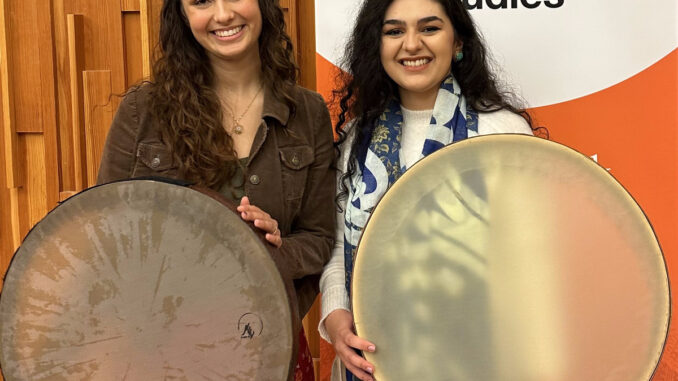
Theme of Language & Politics speaks to music, multilingualism, Islamic law, literature, culture
The 10th annual Middle East & North Africa (MENA) Symposium took place between Feb. 27-29. This year’s theme of Language and Politics was explored through a variety of wonderful events that underscored the region’s linguistic and ideological diversity.
The first event of the symposium was a Daf workshop hosted by Yasamin Mehdian, a Portland local. Mehdain’s experience with playing Daf, a Persian drum, started when she was nine years old and she has been playing ever since.
Having immigrated from Tehran, Iran to Portland in 2015, Mehdian shared that practicing and listening to traditional Iranian music is one of the most important ways she has found to help her stay connected with her culture.
Mehdian’s dynamic workshop started with listening to Daf music, then moved into a brief history of the ancient instrument and the ways in which it has been preserved through the centuries. The workshop culminated in attendees learning how to play the Daf themselves. Although Mehdian noted that it is difficult to find traditional Iranian music played live in Portland, she is always on the lookout for folks interested in sharing this beautiful music. You can find her on Instagram @Yasamin_Mehdian.
The first day of events concluded with the first of this year’s two impressive keynote speakers. Oregon State University’s Professor of French and Francophone Studies Nabil Boudraa gave a presentation titled “Navigating the Linguistic Mosaic in Algeria: Unraveling the Complexities and Paradoxes of Multilingualism,” which discussed the problems and paradoxes of multilingualism in Algeria. Boudraa enlightened the students in attendance with a historical overview explaining how Algeria became the multilingual country it is today before offering more modern insights.
Specifically, Boudraa spoke about how, in the past few years, Algerians have begun to codify Tamazight, Derja and Kabyle – the dominant colloquial languages in Algeria. This new movement comes after the long struggle of Algerian writers feeling unable to truly express themselves in their work.
This was summed up in Dr. Boudraa’s presentation with a quote from the late Algerian writer and poet Jean Amrouche: “I write in French but I can only cry in Kabyle.”
Day two of the MENA Symposium was another full day of events. The afternoon started off with an engaging student research panel in which four students presented papers on topics ranging from queer MENA identities to issues of aestheticization. Afterwards, there was a catered welcome dinner. The evening’s delicious food was coupled with tables for attendees to learn how to write their names in Arabic and a table for people to pick out and receive henna designs.
When asked about her favorite part of this year’s symposium, co-chair Jenna Woodring ’25 said that the welcome dinner was at the top of her list.
“Teaching people Arabic calligraphy was very rewarding! It was fun to watch people write in Arabic and begin to see it in a different light – besides looking beautiful, it’s also quite the skill. The learning that takes place throughout the entire symposium brings together a really engaged community,” she said.
The MENA Symposium’s third and final day included another student panel, this time covering media portrayals of MENA topics. Following the discussion, Fardosa Yusuf ’26 presented a deeply moving Palestinian poem before sharing some of her own work.
The final event of the symposium was the second keynote speaker, who was also part of the LC community, Associate Professor at the Law School Tabrez Ebrahim. His presentation, “Islamic Theory of Intellectual Property Law,” focused on Islamic law and the ways in which it interprets intellectual property law. He has a forthcoming publication of work under the same title to be printed in “IP Theory,” an intellectual property law journal.
During his presentation Ebrahim argued that, in some ways, the reformation of the Western intellectual property legal systems could benefit from some of the principles provided by Islamic Law.
The two student co-chairs for the MENA Symposium were Jana Qasem ’26 and Nadav Ben-David ’25. Ben-David shared his reflections on the experience as part of a long-term planning process.
“I thoroughly enjoyed assuming a leadership role on campus and contributing to the creation of something impactful,” Ben-David said. “The process involved extensive time and planning, starting last year, gradually fleshing out the events, our team, and the overall concept.”
He also spoke to the aspects of both the symposium events and the ongoing work prior that stuck with him the most.
“Perhaps the highlight for me was the opportunity to engage in dialogue and share meals with our keynote speakers, as well as the satisfaction of bringing something new into existence,” Ben-David said.
While the MENA Symposium has already finished, anyone wanting to assist in organizing, participating in or attending next year’s events should keep their eye on the horizon — this rapidly growing symposium is always wlooking for folks to engage with their events.
Subscribe to the Mossy Log Newsletter
Stay up to date with the goings-on at Lewis & Clark! Get the top stories or your favorite section delivered to your inbox whenever we release a new issue.

Leave a Reply